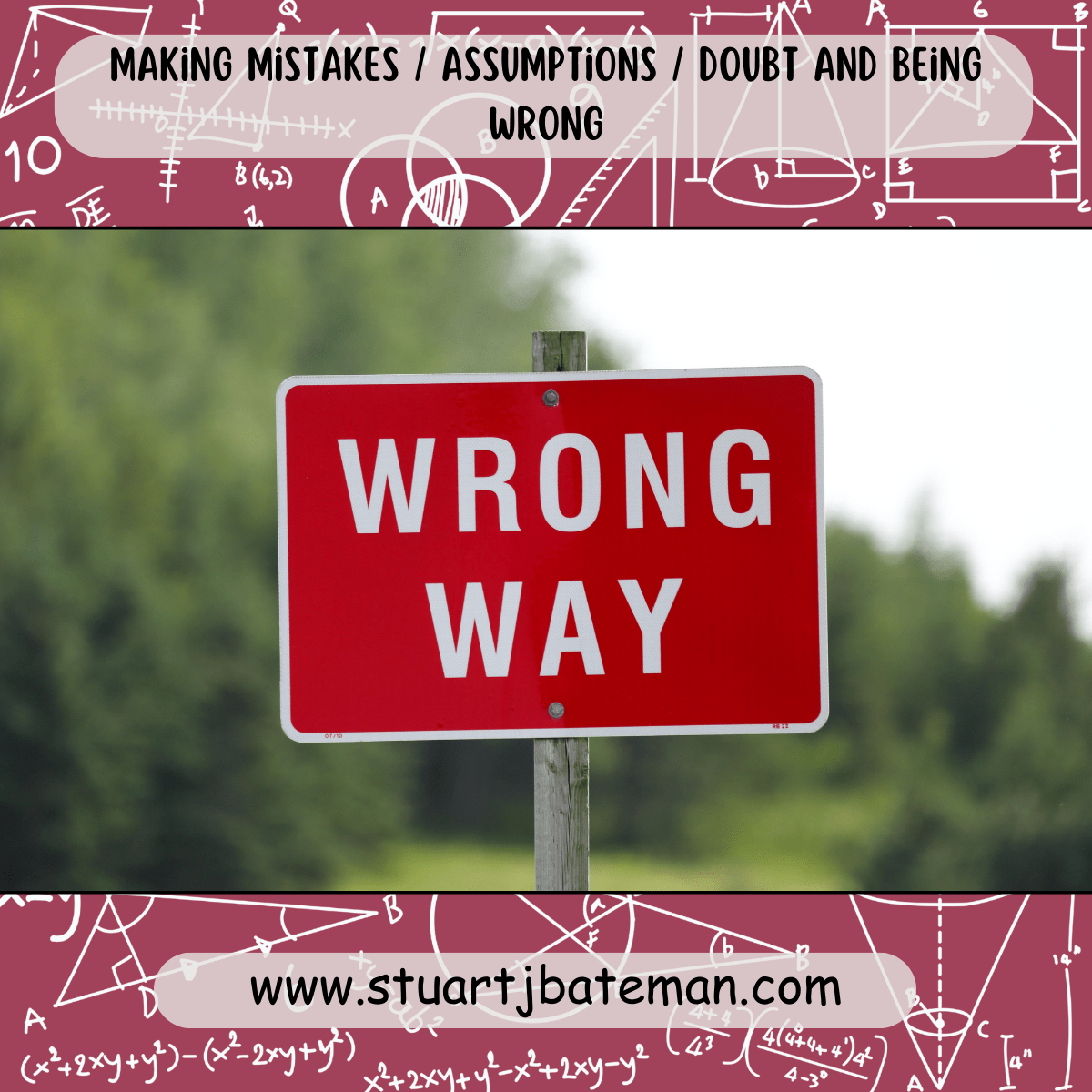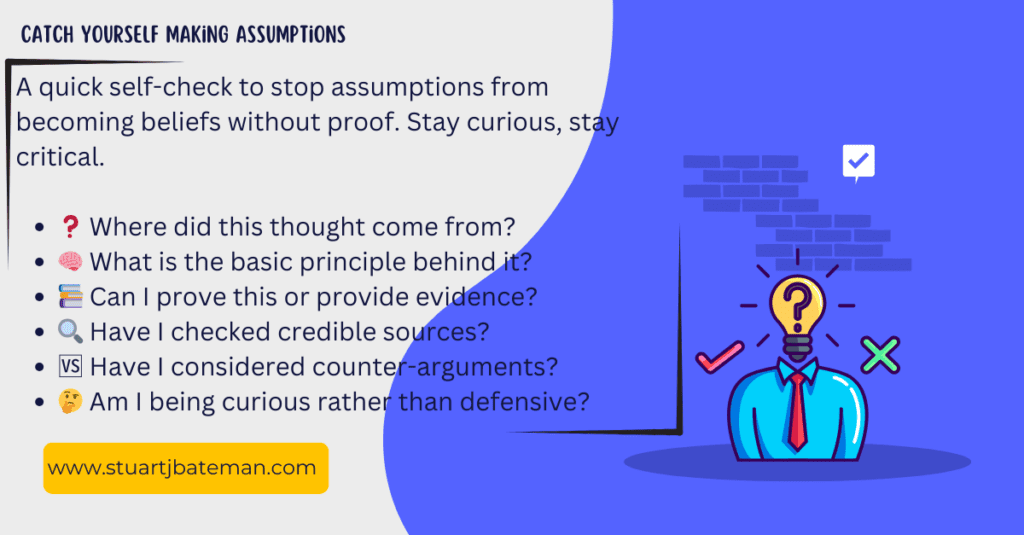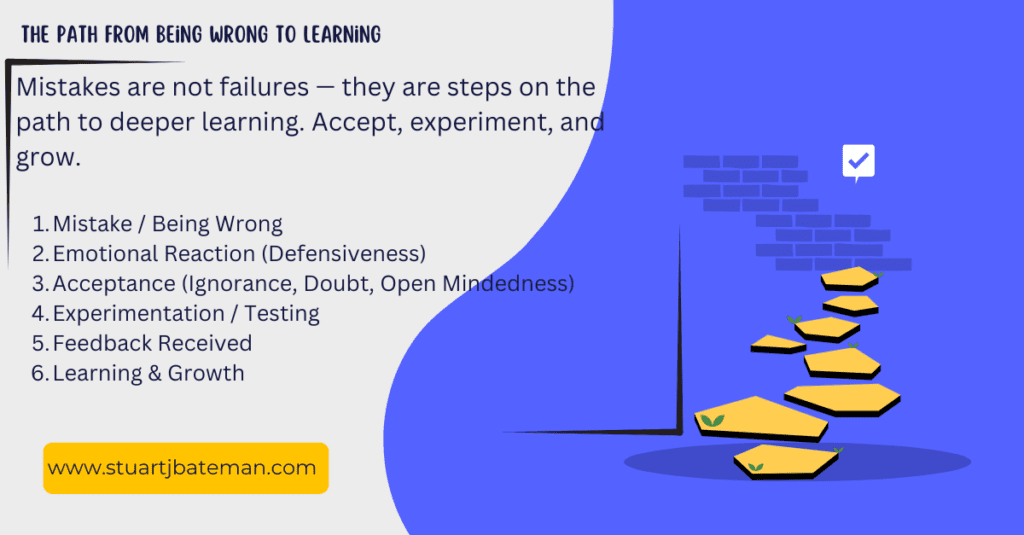Making mistakes / assumptions / doubt and being wrong
Your assumptions are your windows on the world. Scrub them off every once in a while, or the light won’t come in – Isaac Asimov

Right thinking = Right start series
Assumptions
It can’t really be any plainer than this statement from one of the great science fiction writers, however the definition of an assumption is a thing that is accepted as true or as certain to happen without proof, the last two words are the key “without proof” we so often make assumptions without realising but why?
We use them because it’s a way for our energy hungry brains to short cut and do less work therefore consume less energy, we use past experiences to find patterns in what we see now to explain to ourselves or others what’s happening. Without being challenged this becomes our belief, more can be found in the book “Thinking, Fast and Slow” – Daniel Kahneman (or if you like look up the Veritasium YouTube video).
However, we do use assumptions in academic / science and industry, they are classed as unexamined beliefs and limitations that are recognised in reports and studies, this is important to the process of learning as the paper / report is peered reviewed and those assumptions can be challenged (and more found). So on some level it is possible to recognise when we make an assumption, but what about in general working days /lives and conversations, can we catch our assumptions?
The simple answer is to always question your thoughts (that might cause you to stop doing things and takes time), which is one way but another is to have working groups that encourages debate and questions your thoughts. So at work having a team that bounces ideas or conversations around asking if you can proof what you’ve said is a powerful tool, how about working by yourself?
It’s best to start after that idea / thought or belief and ask “Where did I get that from?” if you answer I don’t know you’re off to a good start to go investigate, so the second key here is to be curious.

It takes a lot of practise to put the brakes on for wanting an answer straight away and again life isn’t setup for us to sit down to ponder over our belief, action counts. However, time spent thinking just for 5 mins will save you countless rework, so to summarise.
- Question your assumptions & others
- Where did the thought or idea come from?
- What is the basic principle?
- How can you prove this?
- Be Curious
- Have an open mind for new ideas but be sceptical
- Challenge – ask for the proof
- When presented with new information, ask for the person who gave that to you to back it up
- What are the sources?
- Are the sources credible?
- What are the counter arguments?
- If you don’t know say so!
- It’s hard show people that you don’t know the answer, but admitting there’s a gap in your knowledge will help you to learn
Being Wrong
The way of life / culture / school & work have been set up and run, we find ourselves trapped with the reinforcement that we should not be wrong.
This starts with our parents and to borrow from Neil deGrasse Tyson, his example of a child dropping eggs is a clear indication of where it starts to go wrong, the child is told off for dropping the eggs and making a mess when in reality a child is learning and experimenting constantly with the world and finding out facts from it, namely if I let go of this thing what happens? The result is / could be a telling off.
We can’t be half right or half wrong, competition rewards success not failure and everywhere we look it’s the same story. Only so often you’ll hear the familiar “Edison took 1000 attempts to make a light bulb”, but this idea of him trying and finding all the way a bulb won’t work until he worked out the correct way seems lost.
Are we so lost in a world where assumptions based on experience is driving us to react quicker to solve problems rather than taking the time to work through and find the correct solution instead of failing when the assumption is proven wrong and based on incorrect beliefs or facts? So much today a company must react to situations to ensure cash flow continues.
Now it’s surprising to tell you that scientists get excited when long held ‘laws’ are proven wrong – why? Because that’s how we learn what reality is and step closer to the truth by knowing what paths the wrong ones are to take.
Many of us need to relearn what being wrong is, because we react the same way to criticism – we become defensive and emotional. I’m probably stating the obvious here, but has it really sunk in? do I need to quote greats like Feynman? Who said, ‘We guess the laws of nature and if it doesn’t agree with nature, it’s wrong”, do we need 100’s of studies to argue the balance that there is or is not a significant different from being wrong and learning from it? Or should we accept that our method of understanding reality is to test everything?
The last four segments I’ve written all point to this idea of experimenting to learn, we need to be ignorant (accept we are) / doubtful / sceptical / open minded & uncertain as these qualities (which can be seen as negative) are what we need to change ourselves with. I won’t say it’s all common sense because that requires experience first.
It’s important to note mistakes and being wrong do have a place where they can’t exist, as Tom Heick mentions (from his site) in Warfare and Operations these can kill. This is where practise and theory in laboratories should be used to learn with.
In short what we are all looking for is feedback.

This is why we have Statistics / Lean and Six Sigma which is evidence based learning from empirical measurements.
References used
- Vertasium – YouTube channel
- “Thinking fast, Thinking Slow” – Daniel Kahneman
- Laurenc Prusak – NASA
- Tom Heick – teachthought.com
- Miguel Angel Ruiz
- Questioning Assumptions – Clifton A. Poodry* and David J. Asai
- Stating the Obvious: Writing Assumptions, Limitations, and Delimitations – PHDStudent.com



What are your thoughts? Have I covered everything or is there more you know and would like to share?
I’m always learning and improving this site and my blogs, so please feel free to get in touch with me via LinkedIn or this site to discuss any topics I have covered.
If you’re having trouble finding ways to progress check out these sites filled with free learning tools:


Discover more from The Chartered Engineer
Subscribe to get the latest posts sent to your email.